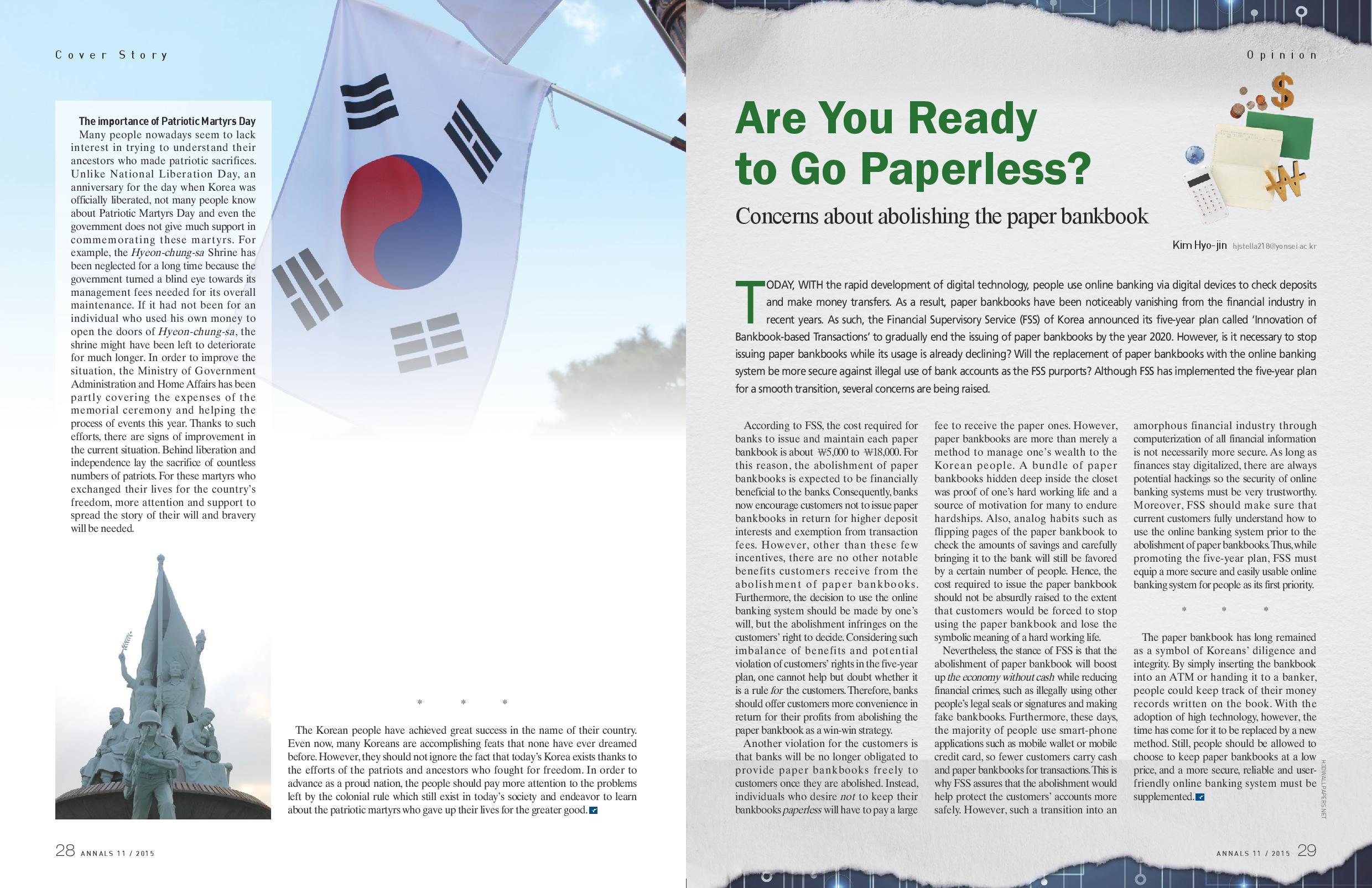Concerns about abolishing the paper bankbook

TODAY, WITH the rapid development of digital technology, people use online banking via digital devices to check deposits and make money transfers. As a result, paper bankbooks have been noticeably vanishing from the financial industry in recent years. As such, the Financial Supervisory Service (FSS) of Korea announced its five-year plan called ‘Innovation of Bankbook-based Transactions’ to gradually end the issuing of paper bankbooks by the year 2020. However, is it necessary to stop issuing paper bankbooks while its usage is already declining? Will the replacement of paper bankbooks with the online banking system be more secure against illegal use of bank accounts as the FSS purports? Although FSS has implemented the five-year plan for a smooth transition, several concerns are being raised.
According to FSS, the cost required for banks to issue and maintain each paper bankbook is about ₩5,000 to ₩18,000. For this reason, the abolishment of paper bankbooks is expected to be financially beneficial to the banks. Consequently, banks now encourage customers not to issue paper bankbooks in return for higher deposit interests and exemption from transaction fees. However, other than these few incentives, there are no other notable benefits customers receive from the abolishment of paper bankbooks. Furthermore, the decision to use the online banking system should be made by one’s will, but the abolishment infringes on the customers’ right to decide. Considering such imbalance of benefits and potential violation of customers’ rights in the five-year plan, one cannot help but doubt whether it is a rule for the customers. Therefore, banks should offer customers more convenience in return for their profits from abolishing the paper bankbook as a win-win strategy.
Another violation for the customers is that banks will be no longer obligated to provide paper bankbooks freely to customers once they are abolished. Instead, individuals who desire not to keep their bankbooks paperless will have to pay a large fee to receive the paper ones. However, paper bankbooks are more than merely a method to manage one’s wealth to the Korean people. A bundle of paper bankbooks hidden deep inside the closet was proof of one’s hard working life and a source of motivation for many to endure hardships. Also, analog habits such as flipping pages of the paper bankbook to check the amounts of savings and carefully bringing it to the bank will still be favored by a certain number of people. Hence, the cost required to issue the paper bankbook should not be absurdly raised to the extent that customers would be forced to stop using the paper bankbook and lose the symbolic meaning of a hard working life.
Nevertheless, the stance of FSS is that the abolishment of paper bankbook will boost up the economy without cash while reducing financial crimes, such as illegally using other people’s legal seals or signatures and making fake bankbooks. Furthermore, these days, the majority of people use smart-phone applications such as mobile wallet or mobile credit card, so fewer customers carry cash and paper bankbooks for transactions. This is why FSS assures that the abolishment would help protect the customers’ accounts more safely. However, such a transition into an amorphous financial industry through computerization of all financial information is not necessarily more secure. As long as finances stay digitalized, there are always potential hackings so the security of online banking systems must be very trustworthy. Moreover, FSS should make sure that current customers fully understand how to use the online banking system prior to the abolishment of paper bankbooks. Thus, while promoting the five-year plan, FSS must equip a more secure and easily usable online banking system for people as its first priority.
* * *
The paper bankbook has long remained as a symbol of Koreans’ diligence and integrity. By simply inserting the bankbook into an ATM or handing it to a banker, people could keep track of their money records written on the book. With the adoption of high technology, however, the time has come for it to be replaced by a new method. Still, people should be allowed to choose to keep paper bankbooks at a low price, and a more secure, reliable and user-friendly online banking system must be supplemented.
Kim Hyo-jin
hjstella218@yonsei.ac.kr

